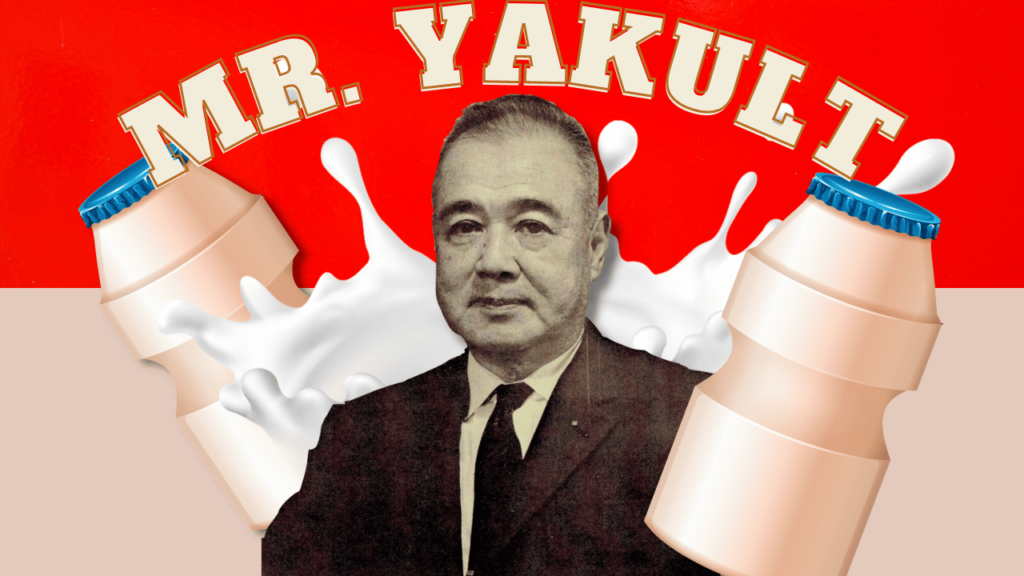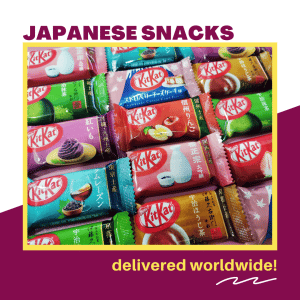[ad_1]
In the same year, Shirota went on to obtain his doctoral degree in medicine and became a lecturer at Kyoto Imperial University. However, his work was far from finished.

The Birth of Yakult
Shirota firmly believed that the key to health was “not to treat disease, but to prevent contracting it”. As such, he wanted to develop a supplement that could provide the Shirota strain to as many people as possible in consumable form. He also believed that good health should be available to all people, regardless of wealth or status.
He went on to develop none other than the internationally famous probiotic drink, Yakult, a fermented milk-based beverage containing billions of units of Shirota strain. (The name Yakult comes from the Esperanto word for yogurt, “jahurto”). [7]
Dr. Shirota began marketing Yakult in 1935 by handing out bottles individually to patients in his region. However, word got around quickly, and demand sky-rocketed. So he hired a door-to-door sales team that provided both the drink and information to potential customers. Business grew in a grassroots movement-like fashion, selling for just 5 yen, or as Shirota put it, “the price of one postcard and a cigarette”.
Eventually, the business expanded not just across Japan, but overseas as well, soon reaching over 500 branches worldwide. Shirota established the Yakult Headquarters in 1955 in Tokyo, and assumed the position of chairman and director of the Research Institute. [4][8]

Yakult Ladies
During the war, Shirota took an innovative approach to make Yakult more widely available throughout Japan. To keep business going, he needed to ensure Yakult could still reach people in perfect condition, in a timely manner, and in all sorts of weather. This required workers who were patient, serious, and dedicated to their mission. And who met those requirements better than a housewife?
So while the men were on the battlefield, Shirota employed women as part-time distributors to hand out Yakult door-to-door. It was an innovative approach, as it was still rare for women to work outside the home. But Shirota and his team of hard-working housewives went strong. In 1963, the official Yakult Ladies home delivery system was born. Soon, Yakult Ladies on bicycles with bulks of Yakult in tow became a regular sight all throughout Japan. [7]
Yakult Keeps Up With The Times
Yakult as a company always keeps in touch with the times, launching new versions every so often in response to new research findings and health trends. The latest release was Yakult 1000, which came out last April and contains a whopping 100 billion units of Shirota Strain! Yakult containers have undergone a series of changes, as well.
Yakult began in glass milk bottles. However, production costs grew, as did the weight the Yakult Ladies had to bear. Shirota switched over to smaller, lighter, and cheaper plastic containers in 1968. The now-iconic design was a novel idea at the time. The compact containers fit in the palm of your hand, and were easier to hold for young children and elderly people with poor grip. The polystyrene material was hygienic and safe, and the aluminum foil cap kept air from entering and spoiling the drink. The small 65ml size was also a safe amount to drink at once for children and the elderly.
Shirota-ism & Yakult Corporate Culture
Dr. Minoru Shirota proposed many key ideas in preventive medicine throughout his research. These ideas now form the essence of Yakult, and have been collectively dubbed ‘Shirota-ism’. The three key concepts are:
- Medicine should be used as prevention rather than cure.
- A healthy gut promotes a longer life.
- Good health should be accessible to everyone, regardless of wealth or status. [5]
Shirota-ism also forms the foundation of the company’s inclusive corporate culture. Matsumoto Masatoshi, head of Yakult HR, states: “I believe that because all employees have implemented Shirota-ism, we’ve created a corporate culture where everyone can work together in peace”. [6]
Yakult headquarters takes equal employment seriously. As of 2018, there are at least 50 employees with disabilities working at Yakult. According to Matsumoto:
“We don’t have specific departments or jobs for people with disabilities. All roles and career development opportunities are available to all. What we emphasize is the ability to work as team members throughout all our offices nationwide. In other words, as long as you can make the most of your abilities, anyone can play an active role. However, during recruitment, full-time public health nurses always conduct interviews to discuss the person’s disabilities and any necessary considerations we must take from a professional perspective. After work, we make sure to follow up with individuals via the HR department. In addition, public health nurses are available for employees to seek consultation about their disability. Surrounding staff members also provide any necessary support. We do this because we valuable our workers”.
Matsumoto [6]
Shirota Minoru’s Legend Lives On
Minoru Shirota passed away in 1982 at the age of 82, bearing witness to the success of his brand and the fruit of his labor. He accomplished the goal he set for himself decades ago, providing a means to a healthier gut to people all over the world at an affordable price in the form of a petite, probiotic drink.
Yakult is currently available in over 30 countries. There’s even a Shirota Memorial Museum in the Yakult Headquarters Central Research Institute in Kunitachi City, Tokyo. And the Yakult company, as well as the Central Research Institute itself, continues to carry on the development of new research and technology.
Although Japan has never been much of a dairy-consuming nation, the insane popularity of Yakult is obvious. Not only did Dr. Shirota Minoru accomplish his goal. He created a legend. And that legend lives on in the form of a tiny, iconic bottle: Yakult.

What to Read Next:
A Forgotten Samurai Energy Drink
Resources
[1] 代田稔. Wikipedia JP
[2] 長野県とヤクルトのつながりって?[長野県からはじまるヤクルト誕生秘話]. Yakult
[3] 昔の起業家 – 代田稔 (ヤクルト). 起業x小学生
[4] 沿革. Yakult
[5] 代田イズム. Ehime Tobu Yakult
[6] 「代田イズム」のもと誰もが活躍できる風土が生まれる. Sana Archives
[7] ヤクルトのシロタ株の由来になった代田稔(しろたみのる)さんって誰? 好奇心ブログ
[8] ヤクルト:毎日2400万人が愛飲する乳酸菌飲料のパイオニア. ニッポン・ロングセラー考
[9] 知れば知るほど「シロタ株」. Yakult
[10] ヤクルト. Wikipedia JP
[ad_2]
Source link



